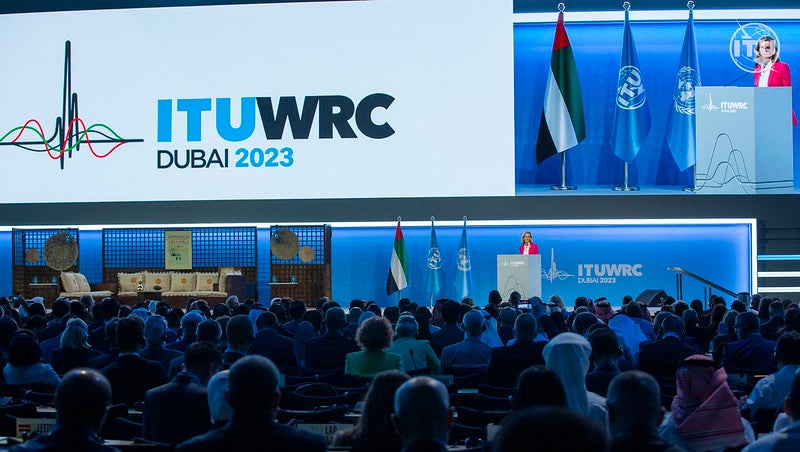Latest News

Doreen Bogdan-Martin, Secretary-General of the International Telecommunication Union (ITU) at WRC-23. Photo: ITU/D. Woldu
With the 2023 World Radiocommunications Conference (WRC) behind us it is time to look ahead to WRC-27. And what a road it will be to get there. WRC-23 made progress on many notable achievements including ensuring we have access to the spectrum we need for 5G terrestrial and non-terrestrial services, providing increased flexibility for operators, and making sure our critical science services are available to operate.
However, where WRC-23 (and the 2023 Radio Assembly, RA-23) made its most distinct mark was in the selection of ambitious WRC-27 agenda items ranging from establishing the first generation of lunar communications to ensuring that there is equitable access to the Non-Geostationary Orbit (NGSO) and associated frequencies to studying space sustainability to ensuring that satellite networks do not provide unauthorized services.
Accordingly, the WRC-27 agenda is perhaps the most novel and far-reaching WRC agenda we have seen since the 1980s to 1990s, when the International Telecommunications Union (ITU) addressed equitable access to the Geostationary Orbit (GSO) and started to craft the regulatory framework for NGSO satellite networks. It was these WRCs that set the basis for many of the issues that will be the focus of the WRC-27 study cycle.
With the success of NGSO satellite networks, which were developed in the 1990s, developing countries that are facing the same concerns they saw in the 1980s with GSO satellite systems – that they will not be able to gain access to the orbit and frequencies they need in the future when they are ready to deploy similar systems. Developing countries were clear on the need to address these concerns as soon as possible. This led WRC-23 and RA-23 to advance both studies on space sustainability and on equitable access, with action on the latter to be taken at WRC-27.
It is also the success of these NGSO satellite networks that led to a concern by a number of countries that these networks are operating without the explicit consent of countries where they are transmitting. In fact, a number of countries during WRC-23 provided examples of this, building on a recent finding by the ITU’s Radio Regulations Board (RRB) against SpaceX for operating without consent in Iran. This led to adoption of an agenda item for WRC-27 that will focus on ensuring that operators are not transmitting from a country without the explicit consent of that administration. This issue has been around for well over a decade and existed with GSO satellites as well. However, it is the proliferation of large NGSO satellite networks that caused a significant number of countries to support WRC action to address this issue.
And finally, as technology continues to progress, and as a result of the Artemis Accords and the increasing number of countries with ambitions to operate communications networks on the moon and other celestial bodies, WRC-23 has support to establish the first framework for lunar communications. The first step of this action will be in the frequency bands used for the science services, but we can expect a WRC-31 agenda item to move into the commercial frequency bands and require increased focus by the ITU as lunar networks are implemented.
When looking back at WRC-23, we should be thankful of the important steps forward it took on meeting the needs for access to additional spectrum and increased operational flexibility, but we must take notice of the ambitious agenda item it established for WRC-27. It will be WRC-27 that will address how our space communications environment will evolve in the future.
 Jennifer A. Manner is Senior Vice President of Regulatory Affairs at EchoStar Corporation. She is responsible for the company’s domestic and international regulatory and policy issues, including spectrum management, new technologies, and market access.
Jennifer A. Manner is Senior Vice President of Regulatory Affairs at EchoStar Corporation. She is responsible for the company’s domestic and international regulatory and policy issues, including spectrum management, new technologies, and market access.
Stay connected and get ahead with the leading source of industry intel!
Subscribe Now